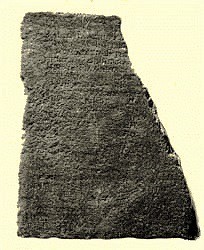"My opinion is that Adam never worshiped idols, but that he did worship planets, approximating through this form of devotion to what is higher than the planets and stronger than they." If you contemplate this statement by Yanbushad, you'll find that it excludes idolatry as a means of approaching the living, speaking gods. You'll also notice it's expressed as Yanbushad's opinion, and not a categorical declaration, even though he knew for a certainty that Adam was no idolater.
There is evidence for all I'm saying—to wit, that Yanbushad did not countenance idolatry, nor even perhaps the worship of the sun and moon—in his book On the seasons, where he says: "The earthly consequences of the seasons' rotation are not the work of a visible mover, but a Mover too subtle to be perceived with the senses." The passage ends in what seems like a barrage of digressions, deliberately interspersed with enigmas and double meanings, and this is how his beliefs are often stated, becoming clear only after diligent contemplation of the text.
[And sometimes his beliefs went unstated.] "Oh sage," Yanbushad was once asked, "why do you spend your life in waterless desert wastes, instead of attending the festivals of your people and observing their devotions?" He said, "If their form of worship were agreeable to me, I would not be averse to what they practice in their temples, and I would follow their path."
"May your lord have mercy on you," the asker said. "Let us know exactly where their path goes wrong, and we will follow yours." Yanbushad remained silent, and gave no answer. The man repeated his question several times, at which Yanbushad fixed his gaze on him without speaking, until the asker turned away, crying, "Yanbushad is mad! Mad, I tell you!"
There is further evidence for Yanbushad's beliefs in his conformity with the Book of Agriculture of Anuha, whose views he upheld against those of Tamithra the Canaanite. Against Tamithra, who propagated the worship of idols, and ruled that abstainers should be imprisoned and flogged, Yanbushad was sharply critical, and wholly uncritical of Anuha, the famous rebel against the idolatry of his people who was subjected to corporal punishment and imprisoned for his beliefs. When Yanbushad told the story of Anuha's maltreatment by the people of his city, he took relish in narrating their destruction, and how their own god sent a rainstorm to their country and drowned the place, along with the territories of the numerous Greek and Chaldaean nations. Anuha alone was saved, and sought refuge in Egypt, and when the Egyptians drove him away they too were destroyed by a terrible famine.
From Nabataean Agriculture by Ibn Wahshiyya








